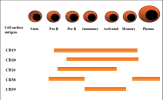Cure
In terms of cure, so my understanding is that compared to CFS you can't really get rid of it permanently. So the autoantibody generation process is basically stuck on in Lupus patients forever, but with treatment, it can be managed so patients can have a decent QoL. Is that correct?
So far lupus has not been cured to my knowledge but the recent CAR-T cell therapy cases have long remissions and may be cured. Lupus quite often becomes quiescent after ten or more years though. Also some features of lupus appear to go in to permanent remission (we are now talking 20 years since our first cases were treated). Patients can lose particular organ involvement - thrombocytopenia or renal disease for instance. In isolated immune thrombocytopenia a good proportion of cases remit long term after rituximab.
This aligns with what I read on the Lupus reddit, patients being on long term immunosuppressant treatment forever (aka you stop and it comes back). Are there cases like you said in CAR-T cell for Lupus, the patients do several treatments and they are pretty much cured from Lupus forever.
I find the issue of 'memory' in Lupus vs ME quite interesting. It's like a
Markov chain (a concept in probability), where in CFS there is patients can reach an
absorbing state (cured forever) but in Lupus there is none.
Plasma Cells
Is there definitive evidence that it is long lived plasma cells in the protected sites that are generating Lupus AABs? As my understanding is that AAB production can come from plasmablast/SLPC/LLPC, so different sources. Has the specific sources been identified and tested?
Because in ME, at least you have a failed Ritux trial and a 'successful' Dara trial which lets us infer it is LLPC rather than SLPC being the problem in ME.
Comparison to CFS
I'm asking because in comparison to ME, we have some complete remissions on Ritux/Cyclo/Dara
without needing continual treatment. So in these cases, the AAB generation process was permanently halted (assuming it is AAB of course) after treatment was stopped.
So my theory would be that in Lupus vs ME:
1. Both are AAB mediated but Lupus AABs are diff from CFS AABs (former causes permanent organ damage, is identifiable by tests. Latter causes no permanent damage and we do not have tests that can identify them yet).
2. Both have diff sources of AAB production within lymphocytes: Lupus is caused by
SLPC continuous renewal while ME is caused by
one time LLPC living for decades. This is why Ritux 'works' in Lupus but not in ME.
3. Because of the source different, this explains why there is memory in Lupus but not in ME. SLPCs are continuously renewed after stopping treatment in Lupus while once you knock out the LLPCs in ME you are good to go.

